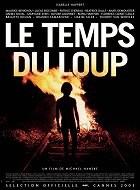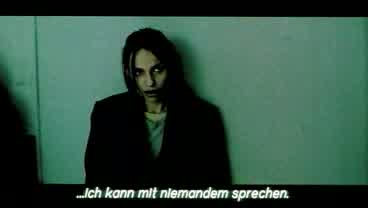Regie:
Michael HanekeDrehbuch:
Michael HanekeKamera:
Jürgen JürgesBesetzung:
Isabelle Huppert, Béatrice Dalle, Patrice Chéreau, Rona Hartner, Maurice Bénichou, Olivier Gourmet, Luminița Gheorghiu, Anaïs Demoustier (mehr)Inhalte(1)
Als Anne und ihre Familie in ihrem Ferienhaus ankommen, finden sie Fremde darin vor. Diese Konfrontation ist nur der Beginn eines schmerzlichen Lernprozesses: nichts ist mehr, wie es war. Was als Familiengeschichte beginnt, entwickelt sich schnell zur kollektiven Tragödie. Aber es ist auch eine Legende, also die Geschichte eines Opfers und, vielleicht, die Geschichte eines Heiligen. (Verleiher-Text)
(mehr)Kritiken (1)
So far the weakest Haneke I've seen. Uns sympathetic characters in an uninteresting post-apocalyptic world deal with uneventful life struggles and occasionally philosophize boringly. I can't wrap my head around why Haneke felt the need to shoot this. From a creator of his caliber, I would expect that when he embarks on a genre film of this caliber, he has something up his sleeve that substantiates his intention. If he planned to shoot an anti-sci-fi, as I heard somewhere, he certainly didn't succeed. If I compare it, for example, to Solaris, in which Tarkovsky uses space sci-fi to develop his own motives, it is a gross disproportion. Tarkovsky managed to break free from genre boundaries - although he himself claimed inadequately - and created something exceptional. The same was later - even better - achieved in Stalker. Similar superlatives cannot be said about Haneke's Time of the Wolves. You will find some of his typical elements here, but fundamentally the film does not deviate from the post-apocalyptic film genre in any way and has become part of it as just another of many ordinary contributions, which is simply a tremendously wasted potential in Haneke's case. "Michael Haneke's post-apocalyptic film" sounds really delightful on paper, but the final dish is quite undercooked. I have seen much better post-apocalyptic films by far worse directors. But oh well, even a master carpenter sometimes makes a mistake and I forgive the master for this stumble.
()

